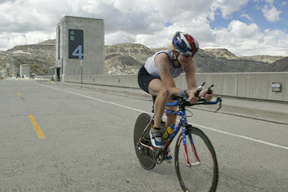I Want those Big, Fast Wheels!
Stacia
March, 2005
A recent question came my way about 650c wheels being slower than traditional 700c wheels. This is not a new question. It has been a topic of conversation at least since the late 80's when many triathlon-specific bikes started using smaller wheels. However,let me give you my view on 650c wheels since I've been racing on this wheel size for 10 years.
When I started cycling 15 years ago I bought a 49cm road bike with 700c wheels (I'm 5'5"). The first thing I noticed was how "out of proportion" the wheels looked on the bike, especially after I purchased a shorter stem to reduce the reach to the handlebars. I also noticed that my front wheel would hit my foot if I turned it very far. There was a pretty sizable pedal/wheel overlap that was caused by trying to fit "big wheels" on my "little" frame.
Using 650c wheels for smaller frames makes a lot of sense and results in a better fit for the rider. The top tube can be made shorter and the smaller wheels allow for a better head tube/fork rake design. As a result the bike can still be made to handle like a Porsche instead of a station wagon. How "fast" a bike is has everything to do with fit and rider position.
But smaller wheels are SLOWER some say! This could not be further from the truth. Is a monster truck with it's HUGE wheels faster than a Mustang with it's "normal" size wheels? Why not? Because wheel size is not the primary factor in determining speed.
Without getting too technical, it is important to remember that the speed at which a wheel turns is based on the combination of gear ratio (front chain ring to rear cog ratio), pedaling cadence, and the circumference of the rear wheel. In cycling terminology there is a concept called "gear inches". This term refers to the distance the rear wheel travels with one revolution of the crank. The more "gear inches" the harder the bike is to pedal. A 650c wheel will travel approximately 3 inches less than a 700c wheel when turned by the same gear ratio. However, it will be easier to pedal (fewer gear inches) so the rider will either pedal faster (increase the cadence) or switch to a slightly larger gear, either of which will equal out the effort.The end result is that the rider will typically "push" the same amount of "gear inches" regardless of which size wheel is on the bike.

Enough of all the techno jargon. Am I slower on my 650c wheels?Hardly. I've been racing for 12 years and last season had the fastest bike split at two local triathlons. I also had the 2nd fastest bike split at Danskin (fastest in the Elite wave - 3rd overall in the race). Both my race and training bikes have 650c wheels with 50/34 compact crank set-ups and 11-23 rear cassettes. More importantly, both my bikes fit and allow excellent, fatigue reducing positioning.
I went out to the garage the other day and hopped on that first road bike just to see what it felt like to ride 700c wheels after all these-years on 650c. It felt like I was riding my big brothers bike! Very bulky and awkward compared to my nimble handling 650c machines.Remember the best bike for YOU is the one that fits you! If speed is what you are seeking FIT always wins out over frame material,weight, componentry, and yes, wheel size. I can't count the number of athletes I see in races and long events who are 'sitting up' on the top of their bars due to discomfort from a poor fit. Get a bike that fits,train right, and attend one of my classes to learn more bike skills so that you will be faster on your 650c bike!
Stacia is a professional coach, and serious athlete with a lot of accomplishments in the triathlon and cycling arena. See Staci's bike and read her letter here.